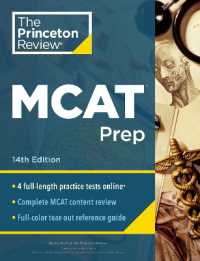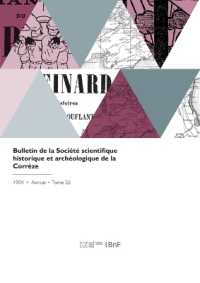Full Description
This book is the first collection of essays on Bernard Williams' moral and political philosophy to shed light on the nature of law, and key legal concepts.
By the time of his death in 2003, Williams was widely regarded as the most important moral philosopher of his generation. Surprisingly, his work is still largely under-discussed in legal theory. This book aims to fill this gap with brand new discussions from scholars both from law and philosophy.
The first part of the book focuses on Williams' work on responsibility and regret and its implications for law. Drawing from Ancient Greek authors, Williams maintained that luck might play a key role in our practices of responsibility and that some dimensions of responsibility are tied to the notion of having a character. What we do - intentionally or not - might affect our understanding of ourselves and of our place in the world. How do those ideas help us in making sense of legal responsibility? How broader concerns about our practices of responsibility impact the law? Those are some of the questions addressed by the authors in this part.
The second part looks at how Williams' understanding of philosophy can shape the way we do jurisprudence. Williams' work on the methodology of philosophy combines resources from analytical philosophy, continental authors, history, and literature. He understood philosophy as a humanistic discipline. The authors in the second part of the book draw from Williams' work, notably his innovative take on the genealogical method, to discuss how we could practice legal philosophy in this same spirit.
Contents
Introduction: Bernard Williams as a Legal Philosopher, Daniel Peixoto Murata (University of São Paulo, Brazil), Julieta A Rabanos (University of Belgrade, Serbia), and Veronica Rodriguez-Blanco (University of Surrey, UK)
Part I: Responsibility, Regret, and the Law
1. 'The idea of the voluntary is essentially superficial': Bernard Williams on Responsibility and Political Freedom, Ulrike Heuer (University College London, UK)
2. The Politics of Civic Maturity v the Politics of Justice: Reflecting on Bernard Williams' Separation Thesis, Veronica Rodriguez-Blanco (University of Surrey, UK)
3. Internal Reasons, Motivation, and the Proleptic Nature of Blame, Gerard Lang (University of Leeds, UK)
4. Taking the Edge off Professional Ethical Dilemmas, Emmanuel Voyiakis (LSE Law School, UK)
5. Response-Norm Concepts in Law and Morality: A Qualified Defence of Moral Luck, Benjamin C Zipursky (Fordham Law School, USA)
6. Thinking about Shame and Necessity in Liberal Constitutional Theory, Emily Kidd White (Osgoode Hall Law School, Canada)
7. Political Realism, Tragedy, and the Violent Foundations of the State. Reading The Man Who Shot Liberty Valance with Bernard Williams, David Owen (University of Southampton, UK)
Part II: Williams on the Methodology of Philosophy and Jurisprudence
8. Creon's Revenge: Lawfulness and the Genealogy of Law, Stephen Bero (University of Texas, USA)
9. Law and Lawfulness: Genealogy, Jurisprudence and the Thought of Bernard Williams, Christopher Tollefsen (University of South Carolina, USA)
10. The Idea of Humanistic Middle-Range Theory, Damian Cueni (University of St. Gallen, Switzerland)
11. Why Can't Law be More like Morality? Christopher Kutz (U.C. Berkeley, USA)
12. An Unusual but Successful Philosophical Marriage in Bernard Williams: Nietzsche and Wittgenstein, Ronaldo Porto Macedo Jr (University of São Paulo Law School, Brazil)
13. Law as a Test of Conceptual Strength, Matthieu Queloz (University of Bern, Switzerland)
14. Practical Reasoning as Interpretation: Williamsian Remarks on Dworkin's Methodology, Daniel Peixoto Murata (University of São Paulo, Brazil)
15. A Williamsian Account of Jurisprudence as Conceptual Morphology, Miodrag Jovanovic, Bojan Spaic (University of Belgrade, Serbia)








